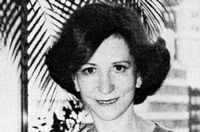 Speaker: by Mrs.Lore Parker
Speaker: by Mrs.Lore Parker
Vice President & Copy-Supervisor, DDB(1966)
While we are on the subject of what kind of people we are, you might be interested to know a little bit of my own history. I am one of those strange types I mentioned earlier. I am not American at all, and English is not my native language. I was born in Germany and brought up in England.
When I had finished my education in America, I got a secretarial job in an advertising agency for only one reason. They paid $5 a week more than the New York Times, which had also offered me a job. If it had been the other way around, I would probably be a reporter today, or the Editor of the Food or Fashion page.
At that time DDB was just beginning to be known, and I wrote a letter to Phyllis Robinson, who was then Copy Chief, telling her why I wanted to work there. That was all. I had very little else to show, and I was hired mostly on the basis of this letter.
Everything I know about copy writing I learned from Phyllis and Bill Bernbach. These were the days of the classic early Bernbach's ads and the beginning of Chemstrand. The agency had 45employees and Bill Bernbach said it was a perfect size, and he wouldn't mind if it never grew any bigger. (Today we have 1300 employees all over the world.)
As DDB grew more famous, its creative people began to be wooed by other agencies. I succumbed to such a temptation and went elsewhere for much more money and, as I thought much more glory. Two years and four agencies later I asked Bill and Phyllis if they would have me back. Many of the people who left DDB have felt the same way -- that, after all, it is the best of all possible agencies. I was one of the lucky ones who returned.
The last thing I would like to tell you about, very briefly, is how DDB has changed between 1949, when I first knew it, and 1966.
It is not the same agency ---and I don't just mean in size or billings. Our "style" has changed and changed and changed again over the years. And by “style" I do not mean a layout or type style, but rather a point-of-view an attitude to the consumer. As the market changed -- as the consumer became more sophisticated -- as DDB matured -- our ads developed along with it. One very important influence in this constant change is the fact that so many of our innovations were copied. As soon as that happens, we feel compelled to abandon this innovation and search and search for something fresh.
We have a way of referring to these various styles by the year in which they saw their heyday. We say something looks like "DDB 1954" or "DDB 1962", as though it were a vintage year on a wine bottle.
At home I have a bulging file of yellowed old proofs -- ads I did over the span of a decade or more, I do not like to look through these files. They make me wince. I am embarrassed by the things I was so proud of 5 or even 3 years ago. I think that is, on the whole, a healthy sign. It seems to indicate that my standards -- along with the agency's standards -- are constantly rising.
I told you before how Bill Bernbach has managed to foster a whole generation of creative people to work under his leadership. He himself has changed, along with his agency -- or rather, the agency has changed along with him.
Bill is no longer the rebel, the iconoclast -- he has become the statesman. He startled me the other day when he turned down a commercial that hit very, very hard and mercilessly at a competitive product.
He said, "There is one thing more important than doing good advertising. And that is being nice people."
Bill Bernbach's agency is no longer the child prodigy of the advertising business. We, are in the ripeness of young middle age.
ln terms of human ages, l would say Doyle Dane Bernbach feels like just about 40.
We are the generation of John F. Kennedy. Kennedy’s favorite word was “vigor. I think that is a word that fits well into the DDB situation today.
In the last few years, an amazing number of very bright, very imaginative young agencies have sprung up all over New York. The press delights in talking about these agencies as giving DDB tough competition. What most people don't realize is that in almost every case the creative movers in these agencies are former DDB’ers.
Take Papert, Koenig, Lois. Take Jack Tinker & Partners. Or Wells, Rich, Green. 0r Gilbert. Our friends and former associates are among the guiding lights in them all.
I think it is very exciting that we are now spawning this litter of bright young agencies. I also think it is great that we no longer monopolize the award shows. There are many new agency names among the medal winners -- and DDB people, instead of just being recipients, now sit on the committees, judge the shows, teach advertising courses at universities, and give speeches.
Most of us, however, must give our speeches to the same familiar Americans in the same old place. I am extremely fortunate. I had a fresh, new -- to me extremely interesting -- audience, in one of the most beautiful countries I have ever visited.
Thank you with all my heart.